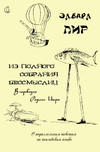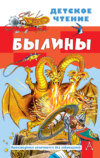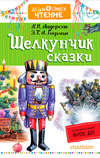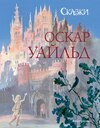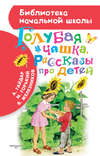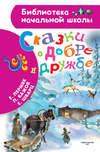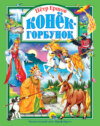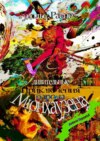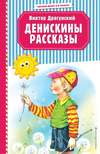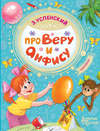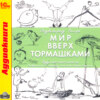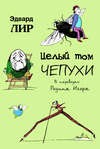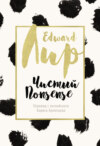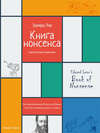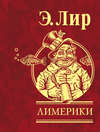Loe raamatut: «Из полного собрания бессмыслиц»
Font:
Nonsense verse and songs
Self-portrait of the laureate of nonsense
How pleasant to know Mr. Lear!
Who has written such volumes of stuff!
Some think him ill-tempered and queer,
But a few think him pleasant enough.
His mind is concrete and fastidious,
His nose is remarkably big;
His visage is more of less hideous,
His beard it resembles a wig.
He has ears, and two eyes, and ten fingers,
Leastways if you reckon two thumbs,
Long ago he was one of the singers,
But now he is one of the dumbs.
He sits in a beautiful parlour,
With hundreds of books on the wall;
He drinks a great deal of Marsala,
But never gets tipsy at all.
He has many friends, laymen and clerical;
Old Foss is the name of his cat;
His body is perfectly spherical,
He weareth a runcible hat.
When he walks in a waterproof white,
The children run after him so!
Calling out, “He's come out in his night-
Gown, that crazy old Englishman, oh!”
He weeps by the side of the ocean,
He weeps on the top of the hill;
He purchases pancakes and lotion,
And chocolate shrimps from the mill.
He reads but he cannot speak Spanish,
He cannot abide ginger-beer:
Ere the days of his pilgrimage vanish,
How pleasant to know Mr. Lear!
The Owl and the Pussy-cat
I
The Owl and the Pussy-cat went to sea
In a beautiful pea-green boat,
They took some honey, and plenty of money,
Wrapped up in a five-pound note.
The Owl looked up to the stars above,
And sang to a small guitar,
“O lovely Pussy! O Pussy, my love,
What a beautiful Pussy you are,
You are,
You are!
What a beautiful Pussy you are!”
II
Pussy said to the Owl, “You elegant fowl!
How charmingly sweet you sing!
O let us be married! too long we have tarried:
But what shall we do for a ring?”
Thwy sailed away, for a year and a day,
To the land where the Bong-tree grows
And there in a wood a Piggy-wig stood
With a ring at the end of his nose,
His nose,
His nose,
With a ring at the end of his nose.
III
“Dear Pig, are you willing to sell for one
shilling
Your ring?” Said the Piggy, “I will.”
So they took it away, and were married
next day
By the Turkey who lives on the hill.
They dined on mince, and slices of quince,
Which they ate with a runcible spoon;
And hand in hand, on the edge of the sand,
They danced by the light of the moon,
The moon,
The moon,
They danced by the light of the moon.

The Children of the Owl and the Pussy-cat
Our mother was the Pussy-cat,
Our father was the Owl,
And so we’re partly little beasts
And partly little fowl,
The brothers of our family
Have feathers and they hoot,
While all the sisters dress in fur
And have long tails to boot.
We all believe that little mice,
For food are singularly nice.
Our mother died long years ago.
She was a lovely cat
Her tail was 5 feet long, and grey
With stripes, but what of that?
In Sila forest on the East
Of far Calabria’s shore
She tumbled from a lofty tree —
None ever saw her more.
Our owly father long was ill
From sorrow and surprise,
But with the feathers of his tail
He wiped his weeping eyes.
And in the hollow of a tree
In Sila’s inmost maze
We made a happy home and there
We pass our obvious days.
From Reggian Cosenza
Many owls about us flit
And bring us worldly news
For which we do not care a bit.
We watch the sun each morning rise,
Beyond Tarento’s strait;
We go out pleasure seeking,
Before it gets too late;
And when the evening shades begin
To lengthen from the trees
Yoy’ll find us merrily dancing
As sure as bees is bees.
We wander up and down the shore
Or tumble over head and heels,
But never, never more,
Can see the far Gromboolian plains
Or weep as we could once have wept
O’er many a vanished scene:
This is the way our father moans —
He is so very green.
Our father still preserves his voice,
And when he sees a star
He often sings to the strings of that
Original guitar.
The pot in which our parents took
The honey in their boat,
But all the money has been spent,
Beside the 5-pound note.
The owls who come and bring us nows
Are often sent away
Because we take no interest
In poltix of the day.

The Duck and the Kangaroo
I
Said the Duck to the Kangaroo,
“Good gracious! how you hop!
Over the fields and the water too,
As if you never would stop!
My life is a bore in this nasty pond,
And I long to go out in the world beyond!
I wish I could hop like you!”
Said the Duck to the Kangaroo.
II
“Please give me a ride on your back!”
Said the Duck to the Kangaroo.
“I would sit quite still, and say nothing but
“Quack”,
Te whole of the long day through!
And we’d go to the Dee, and the Jelly Bo Lee,
Over the land, and over the sea; —
Please take me a ride! O do!”
Said the Duck to the Kangaroo.
III
Said the Kangaroo to the Duck,
“This requires some little reflection;
Perhaps on the whole it might bring me luck,
And there seems but one objection,
Which is, if you’ll let me speak so bold,
Your feet are unpleasantly wet and cold,
And would probably give me the roo-
Matiz!” said the Kangaroo.
IV
Said the Duck, “As I sate on the rocks,
I have thought over that completely,
And I bought four pairs of worsted socks
Which fit my web-fit neatly.
And to keep out the cold I’ve bought a cloak,
And every day a cigar I’l smoke,
All to follow my own dear true
Love of Kangaroo!”
V
Said the Kangaroo, “I’m ready!
All in the moonlight pale;
But to balance me well, dear Duck, sit steady!
And quite at the end of my tail!”
So away they went with a hop and a bound,
And they hopped the whole world three
times round
And who so happy, – O who,
As the Duck and the Kangaroo?

The Daddy Long-legs and the Fly
I
Once Mr. Daddy Long-legs,
Dressed in brown and gray,
Walked about upon the sands
Upon a summer’s day;
And there among the pebbles,
When the wind was rather cold,
He met with Mr. Floppy Fly,
All dressed in blue and gold.
And as it was too soon to dine,
They drank some Periwinkle-wine,
And played an hour or two, or more,
At battlecock and shuttledoor.
II
Said Mr. Daddy Long-legs
To Mr. Floppy Fly,
“Why do you never come to court?
I wish you’d tell me why.
All gold and shine, in dress so fine,
You’d quite delight the court.
Why do you never go at all?
I really think you ough!
And if you went, you’d see such sights!
Such rugs! and jugs! and candle-lights!
And more than all, the King and Queen,
One in red, and one in green!”
III
“O Mr. Daddy Long-legs,”
Said Mr. Floppy Fly,
“It’s true I never go to court,
And I will tell you why.
If I had six long legs like yours,
At once I’d go to court!
But oh! I can’t, because my legs
Are so extremely short.
And I’m afraid the King and Queen
(One in red, and one in green)
Would said aloud, “You are not fit,
You Fly, to come to court a bit!”
IV
“O Mr. Daddy Long-legs,”
Said Mr. Floppy Fly,
“I wish you’d sing one little song!
One mumbian melody!
You used to sing so awful well
In former days gone by,
But now you never sing at all;
I wish you’d tell me why:
For if you would, the silvery sound
Would please the shrimps and cockles round,
And all the crabs would gladly come
To hear you sing, “Ah, Hum di Hum!”
V
Said Mr. Daddy Long-legs,
“I can never sing again!
And if you wish, I’ll tell you why,
Although it gives me pain.
For years I cannot hum a bit,
Or sing the smallest song;
And this the dreadful reason is,
My legs are grown too long!
My six long legs, all here and there,
Oppress my bosom with despair;
And if I stand, or lie, or sit,
I cannot sing one single bit!”
VI
So Mr. Daddy Long-legs
And Mr. Floppy Fly
Sat down in silence by the sea,
And gazed upon the sky.
They said, “This is a dreadful thing!
The world has all gone wrong,
Since one has legs too short by half,
The other much too long!
One never more can go to court,
Because his legs have grown too short;
The other cannot sing a song,
Because his legs have grown too long!”
VII
Then Mr. Daddy Long-legs
And Mr. Floppy Fly
Rushed downward to the foamy sea
With one sponge-taneous cry;
And there they found a little boat,
Whose sails were pink and grey;
And off they sailed among the waves,
Far, and far away,
They sailed across the silent main,
And reached the great Gromboolian plain;
And there they play for evermore
At battlecock and shuttledoor.

Mr. and Mrs. Spikky Sparrow
I
On a little piece of wood,
Mr. Spikky Sparrow stood;
Mrs. Sparrow sate close by,
A-making of an insect pie,
For her little children five,
In the nest and all alive,
Singing with a cheerful smile
To amuse them all the while,
Twikky wikky wikky wee,
Wikky bikky twikky tee,
Spikky bikky bee!
II
Mrs. Spikky Sparrow said,
“Spikky, Darling! in my head
Many thoughts of trouble come,
Like to flies upon a plum!
All last night, among the trees,
I heard you cough, I heard you sneeze;
And, thought I, it’s come to that
Because he does not wear a hat!
Chippy wippy sikky tee!
Bikky wikky tikky mee!
Spikky chippy wee!
III
Not that you are growing old,
But the nights are growing cold.
No one stays out all nights long
Without a hat: I’m sure it’s wrong!”
Mr. Spikky said, “How kind,
Dear! you are, to speak your mind!
All your life I wish you luck!
You are! you are! a lovely duck!
Witchy witchy witchy wee!
Twitchy witchy witchy bee!
Tikky tikky tee!
IV
I was also sad, and thinking,
When one day I saw you winking,
And I heard you sniffle-snuffle,
And I saw your feathers ruffle;
To myself I sadly said,
She’s neuralgia in er head!
That dear head has nothing on it!
Ought she not to wear a bonnet?
Witchy kitchy kitchy wee?
Spikky wikky mikky bee?
Chippy wippy chee?
V
Let us both fly up to town!
There I’ll buy you such a gown!
Which, completely in the fashion,
You shall tie a sky-blue sash on.
And a pair of slippers neat,
To fit your darling little feet,
So that you will look and feel
Quite galloobious and genteel!
Jikky wikky bikky see,
Chicky bikky wikky bee,
Twicky witchy wee!”
VI
So they both to London went,
Alighting on the Monument,
Whence they flew down swiftly—pop,
Into Moses’ wholesale shop;
There they bought a hat and bonnet,
And a gown with spots upon it,
A satin sash of Cloxam blue,
And a pair of slippers too.
Zikky wikky mikky bee,
Witchy witchy mitchy kee,
Sikky tikky wee.
VII
Then when so completely drest,
Back they flew, and reached their nest.
Their children cried, “O Ma and Pa!
How truly beautiful you are!”
Said they, “We trust that cold or pain
We shall never feel again!
While, perched on tree, or house, or steeple,
We now shall look like other people.
Witchy witchy witchy wee,
Twikky mikky bikky bee,
Zikky sikky tee.”
The Pelican chorus
King and Queen of the Pelicans we;
No other Birds so grand we see!
None but we have feet like fins!
With lovely leathery throats and chins!
Ploffskin, Pluffskin, Pelican jee!
We think no Birds so happy as we!
Plumpskin, Ploshkin, Pelican jill!
We think so then, and we thought so still!
We live on the Nile. The Nile we love.
By night we sleep on the cliffs above;
By day we fish, and at eve we stand
On long bare islands of yellow sand.
And when the sun sinks slowly down
And the great rock walls grow dark and brown,
Where the purple river rolls fast and dim
And the Ivory Ibis starlike skim,
Wing to wing we dance around,—
Opening our mouths as Pelicans ought,
And this is the song we nightly snort;—
Ploffskin, Pluffskin, Pelican jee!
We think no Birds so happy as we!
Plumpskin, Ploshkin, Pelican jill,—
We think so then, and we thought so still!
Last year came out our Daughter, Dell;
And all the Birds received her well.
To do her honour, a feast we made
For every bird that can swim or wade.
Herons and Gulls, and Cormorants black,
Cranes, and Flamingoes with scarlet back,
Plovers and Storks, and Geese in clouds,
Swans and Dilberry Ducks in crowds.
Thousands of Birds in wondrous flight!
They ate and drank and danced all night,
And echoing back from the rocks you heard
Multitude-echoes from Bird and Bird,—
Ploffskin, Pluffskin, Pelican jee!
We think no Birds so happy as we!
Plumpskin, Ploshkin, Pelican jill,
We think so then, and we thought so still!
Yes, they came; and among the rest,
The King of the Cranes all grandly dressed.
Such a lovely tail! Its feathers float
Between the ends of his blue dress-coat;
With pea-green trowsers all so neat,
And a delicate frill to hide his feet,—
(For though no one speaks of it, every one
knows,
He has got no webs between his toes!)
As soon as he saw our Daughter Dell,
In violent love that Crane King fell,—
On seeing her wadding form so fair,
With a wreath of shrimps in her shot white
hair.
And before the end of the next long day,
Our Dell had given her heart away;
For the King of the Cranes had won that
heart,
With a Crocodile’s egg and a large fish-tart.
She vowed to marry the King of the Cranes,
Leaving the Nile for stranger plains;
And away they flew in a gathering crowd
Of endless birds in a lengthening cloud.
Ploffskin, Pluffskin, Pelican jee!
We think no Birds so happy as we!
Plumpskin, Ploshkin, Pelican jill!
We think so then, and we thought so still!
And far away in the twilight sky,
We heard them singing a lessening cry,—
Farther and farther till out of sight,
And we stood alone in the silent night!
Often since, in the nights of June,
We sit on the sand and watch the moon;—
She has gone to the great Gromboolian plain,
And we probably never shall meet again!
Oft, in the long still nights of June,
We sit on the rocks and watch the moon;—
She dwells by the streams of the Chankly
Bore,
And we probably never shall see her more.
Ploffskin, Pluffskin, Pelican jee!
We think no Birds so happy as we!
Plumpskin, Ploshkin, Pelican jill!
We think so then, and we thought so still!
€3,11
Žanrid ja sildid
Vanusepiirang:
0+Ilmumiskuupäev Litres'is:
17 oktoober 2018Tõlkimise kuupäev:
2012Kirjutamise kuupäev:
1888Objętość:
231 lk 136 illustratsiooniISBN:
978-5-4253-0448-3Tõlkija:
Õiguste omanik:
Автор